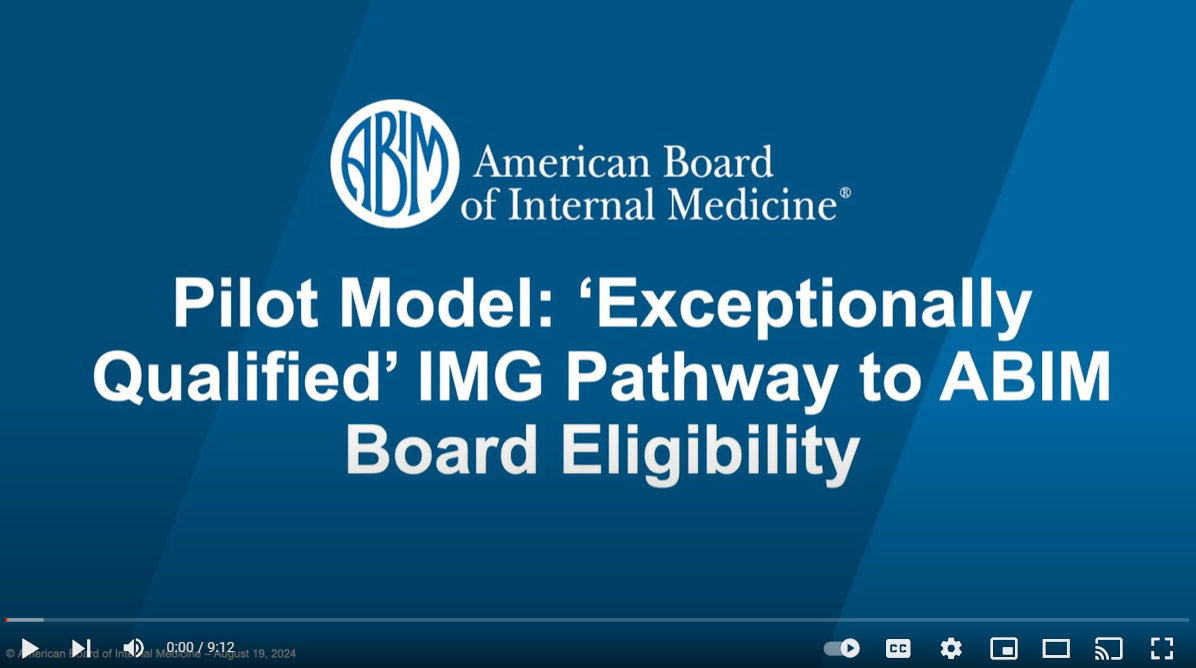The ABIM Council has proposed a pilot model for exceptionally qualified international medical graduates (IMGs) pursuing accredited subspecialty fellowship in the U.S. or Canada to become eligible for ABIM Board Certification. These physicians currently do not have a pathway to board eligibility.
Following thorough discussion among the Specialty Boards and Advisory Committees, and based on input from external stakeholder groups including medical societies, medical organizations (i.e. the Accreditation Council for Graduate Medical Education (ACGME), ACGME-International, Intealth) and program directors, the Council invites the internal medicine community to offer commentary on the proposed pilot.
All diplomates maintaining certification by ABIM are invited to comment by October 1, 2024.

To learn more about the pilot model, please view the 9-minute video above or read through the detailed explanation below and/or the additional FAQs.
The Pilot Concept
The proposed pilot model would be in addition to four existing special consideration pathways that enable American Osteopathic Association (AOA)-accredited or internationally trained physicians to obtain ABIM certification. The new pilot program focuses on physicians who have met the following criteria:
- Successful completion of internal medicine training in another country (or successful completion of a residency accredited by ACGME International).
- Fulfillment of the ACGME criteria to be considered an “exceptionally qualified candidate” (see ACGME Common Program Requirements (Fellowship), III.A.1.c) for subspecialty fellowship training.
- Successful completion of accredited fellowship training in the U.S. or Canada.
The pilot program would allow participating physicians to apply for the Internal Medicine Initial Certification Examination once successful completion of accredited fellowship training is verified. If a physician in this pathway is admitted to and passes the Internal Medicine Exam, they would then be eligible to take the Subspecialty Certification Examination in the area in which they completed accredited training.
Like other ABIM diplomates, physicians in the proposed pilot would need to pass the ABIM Internal Medicine Certification Examination and successfully complete their accredited fellowship training to be eligible for subspecialty certification.
Refining the Pilot Concept
Currently, IMGs who completed residency training outside of the U.S. and Canada and complete accredited U.S. or Canadian fellowships are not eligible to apply for certification in Internal Medicine through ABIM because their residency training does not fulfill ABIM standards of U.S. or Canadian accreditation. Without Internal Medicine certification, they are not eligible to apply for certification in the subspecialty in which they completed accredited training. Partial data from fellowship training evaluations revealed that at least 4,000 physicians already meet the pilot criteria, and there are likely more. The largest numbers of physicians who already meet the pilot criteria are concentrated in certain disciplines, e.g., geriatric medicine, nephrology and infectious disease.
Eligibility for ABIM Board Certification is based on successful completion of accredited training in the U.S. or Canada. Training models are evolving continuously to add in competency-based medical education (CBME) frameworks that center around demonstrating the attainment of the skills and knowledge essential for independent, safe patient care instead of being solely focused on completion of a specific amount of time in training.
In 2023, the ABIM Council began exploring the idea of creating a pilot program for IMGs unable to pursue ABIM Board Eligibility based on the requirements outlined above. The Council charged each of the Specialty Boards and cosponsored Advisory Committees to discuss the proposed pathway and its implications for their disciplines during their annual spring meetings. (More information on these discussions can be found the summary reports on the Blog.) Medical societies also participated in these conversations to help identify those implications.
This past spring, ABIM separately invited medical societies and residency and fellowship program directors across internal medicine and its subspecialties to share their thoughts on the idea. Eighty percent of responding societies supported having a pilot program available, as did nearly two-thirds of responding program directors. Supporters felt that the pilot provided a way to measure the knowledge and skills of these physicians during and after U.S. training, as well as the possibility that it may help disciplines whose training programs have not traditionally filled (e.g., nephrology, geriatric medicine, infectious disease). Those with concerns mentioned the possibility that it may lead to increased competition for U.S. medical graduates seeking training positions, and that the current system did not require changes. Many wanted to know more about the pilot’s goals and proposed outcomes, and in April the Council approved a model to share with the internal medicine community and invite public commentary.
The Pilot Model
In addition to the pilot concept described above, the model includes the proposed pilot goals and outcomes to be measured.
I. Pilot Goals
ABIM hopes the pilot will ultimately remove a barrier to board eligibility for physicians who have already demonstrated meeting the subspecialty and general educational milestones within accredited U.S. or Canadian training programs. The pilot also allows ABIM to move toward a competency-based framework for board eligibility by examining whether these “exceptionally qualified candidates” achieve ABIM certification. Finally, becoming an ABIM Board Certified physician shows that these physicians can and have met the same knowledge standard as other diplomates, and will allow them to continue demonstrating their ability to stay current through ABIM’s Maintenance of Certification (MOC) program.
The pilot model also provides additional benefits: it will allow ABIM to study the profiles and outcomes of these physicians, establishing data and evidence to inform a future decision about whether to recommend that the pilot be turned into an official special consideration pathway.
II. What Questions Will the Pilot Answer?
Through its own data resources, ABIM will be able to monitor the demographics (e.g., what disciplines applicants come from, practice patterns and locations, accredited training information) and level of interest in the pilot (e.g., numbers of applicants who pursue internal medicine and then subspecialty certification, MOC participation, etc.), and evaluate some outcomes (e.g., pass rates, board eligibility data, state medical board disciplinary actions). ABIM can also collect information over time from the pilot participants themselves to include any demographic information not already available, whether they hold a J1 visa, any barriers to practice they experience before or after participation in the pilot and their qualitative experiences in the pilot program.
Overall, ABIM hopes to answer whether the pilot idea is viable (eligible physicians choose to participate), feasible (there are distinct outcomes that pilot participants achieve) and scalable (beginning to identify common concepts of what qualities an “exceptionally qualified candidate” has regardless of specialty).
Defining “Exceptionally Qualified”
One of the main questions asked about the pilot idea was what “exceptionally qualified candidate” means. ACGME has longstanding pathways for internationally trained physicians to be able to enter accredited graduate medical education training programs in the U.S. ACGME has also created specific criteria to be identified as an “exceptionally qualified candidate.” (See ACGME Common Program Requirements (Fellowship), III.A.1.c). Some of these criteria are named below:
- Evaluation by the program director and fellowship selection committee of the applicant’s suitability to enter the program, based on prior training and review of the summative evaluations of training in the core specialty.
- Graduate Medical Education Committee (GMEC) review and approval of candidates’ exceptional qualifications.
- Educational Council on Foreign Medical Graduates (ECFMG) certification documentation.
- Evaluation of performance {in the core competencies} by the Clinical Competency Committee within 12 weeks of matriculation. {Any gaps in competence should be addressed.}
In brief, exceptionally qualified candidates have their international training evaluated by their prospective fellowship program, complete ECFMG credentialing processes and are evaluated early in their fellowship training to determine whether they are on track to achieve the necessary competencies for their discipline, in addition to being formally evaluated on readiness for safe, independent practice and on the six general ACGME competencies.
Additional Questions & Answers
ABIM has asked societies and program directors to share their questions about the pilot. Visit the FAQ webpage for additional questions and answers.
All diplomates maintaining certification by ABIM are invited to comment by October 1, 2024
What Happens Next
Following the public comment period, the ABIM Council will review data and will make the final decision of whether to apply to the American Board of Medical Specialties (ABMS) for approval to offer and implement a pilot program. The Council’s decision is expected early in 2025.
Should the pilot be implemented, it will be made available in all 21 disciplines in which ABIM offers a certificate, regardless of the length of fellowship training.
Questions
Please visit the FAQ page on the ABIM website.
For specific questions regarding the comment form, please contact research@abim.org. For questions about the pilot model please contact sboard@abim.org.



